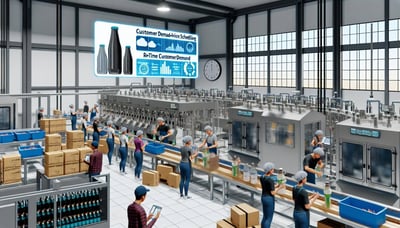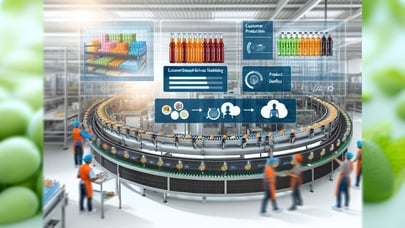Embracing Customer Demand-Driven Scheduling
In the bustling world of food and beverage manufacturing, where customer expectations and market dynamics constantly evolve, Operations Directors face a significant challenge: how to optimize production scheduling to meet customer demands efficiently while maintaining operational excellence. Traditional scheduling methods often fall short in accommodating the dynamic nature of consumer preferences and market fluctuations.
However, by embracing customer demand-driven scheduling approaches and integrating advanced technologies like PlanetTogether with ERP, SCM, and MES systems, Operations Directors can revolutionize their manufacturing processes, ensuring agility, responsiveness, and customer satisfaction.

Customer Demand-Driven Scheduling
Customer demand-driven scheduling revolves around aligning production schedules with actual customer demand in real-time. Unlike traditional forecasting-based approaches, which rely on historical data and assumptions, demand-driven scheduling leverages real-time market insights, enabling manufacturers to adapt swiftly to changing customer preferences, seasonal fluctuations, and unexpected demand spikes.
Key Components of Demand-Driven Scheduling:
Real-Time Data Integration: Seamless integration between scheduling software such as PlanetTogether and ERP, SCM, and MES systems is crucial. This integration ensures that the scheduling process is informed by real-time data on inventory levels, production capacity, material availability, and customer orders. By leveraging this interconnected data ecosystem, Operations Directors gain unparalleled visibility into their supply chain and manufacturing operations, enabling proactive decision-making.
Dynamic Prioritization: Customer demand-driven scheduling prioritizes orders based on factors such as order urgency, customer importance, and product profitability. By dynamically adjusting production schedules in response to shifting priorities, manufacturers can optimize resource utilization and minimize lead times, enhancing customer satisfaction.
Agile Production Planning: Traditional static production plans often fail to accommodate unforeseen disruptions or changes in customer demand. In contrast, demand-driven scheduling enables agile production planning, allowing manufacturers to quickly adapt schedules, allocate resources, and reroute materials to meet changing customer requirements without compromising efficiency or quality.
Collaborative Communication: Effective communication and collaboration are essential pillars of demand-driven scheduling. By fostering collaboration between production, sales, and supply chain teams, Operations Directors can ensure alignment across the organization and facilitate rapid decision-making. Advanced scheduling software facilitates seamless communication by providing real-time updates, alerts, and notifications to stakeholders across the enterprise.

Benefits of Customer Demand-Driven Scheduling
Enhanced Customer Satisfaction: By aligning production schedules with actual customer demand, manufacturers can reduce lead times, minimize stockouts, and ensure on-time delivery, thereby enhancing customer satisfaction and loyalty.
Improved Operational Efficiency: Demand-driven scheduling optimizes resource utilization, reduces idle time, and streamlines production processes, leading to improved operational efficiency and cost savings.
Increased Agility and Responsiveness: In today's fast-paced business environment, agility is paramount. Demand-driven scheduling empowers manufacturers to respond swiftly to market changes, customer requests, and supply chain disruptions, enabling them to stay ahead of the competition.
Better Inventory Management: By synchronizing production with demand, manufacturers can minimize excess inventory, reduce carrying costs, and improve inventory turnover rates, leading to a leaner and more efficient supply chain.

Integration with PlanetTogether and ERP, SCM, MES Systems
Integration between demand-driven scheduling software like PlanetTogether and leading ERP, SCM, and MES systems such as SAP, Oracle, Microsoft, Kinaxis, and Aveva is pivotal in unleashing the full potential of customer demand-driven scheduling. By integrating these systems, Operations Directors can achieve seamless data exchange, eliminate silos, and unlock actionable insights across the entire value chain.
SAP Integration: Integrating PlanetTogether with SAP enables Operations Directors to leverage SAP's comprehensive suite of ERP solutions, including SAP S/4HANA, to synchronize production schedules with demand forecasts, optimize resource allocation, and streamline order fulfillment processes.
Oracle Integration: By integrating PlanetTogether with Oracle's SCM and MES systems, Operations Directors can achieve end-to-end visibility and control over their manufacturing operations, from raw material procurement to finished goods delivery. Oracle's advanced analytics and machine learning capabilities complement PlanetTogether's scheduling algorithms, enabling data-driven decision-making and continuous improvement.
Microsoft Integration: Integration between PlanetTogether and Microsoft Dynamics 365 enables seamless collaboration and communication across the organization, empowering Operations Directors to align production schedules with sales forecasts, customer orders, and inventory levels in real-time. Microsoft's cloud-based infrastructure and AI-driven insights complement PlanetTogether's capabilities, providing scalability, flexibility, and agility.
Kinaxis Integration: Integrating PlanetTogether with Kinaxis RapidResponse facilitates real-time demand sensing, supply planning, and production scheduling, enabling Operations Directors to anticipate market changes, mitigate risks, and optimize resource utilization across the supply chain. Kinaxis' concurrent planning capabilities complement PlanetTogether's scheduling algorithms, enabling synchronized decision-making and scenario analysis.
Aveva Integration: By integrating PlanetTogether with Aveva's MES solutions, Operations Directors can achieve seamless coordination between production scheduling, execution, and quality control processes, ensuring compliance with industry standards and regulatory requirements. Aveva's digital twin technology and predictive analytics complement PlanetTogether's capabilities, enabling predictive maintenance, process optimization, and continuous improvement.
In the dynamic landscape of food and beverage manufacturing, embracing customer demand-driven scheduling approaches is no longer optional—it's imperative. By integrating advanced scheduling software like PlanetTogether with leading ERP, SCM, and MES systems, Operations Directors can unlock new levels of operational efficiency, agility, and customer satisfaction.
With real-time data integration, dynamic prioritization, agile production planning, and collaborative communication, manufacturers can stay ahead of the curve, meeting customer demands with precision and responsiveness. As we navigate the complexities of modern manufacturing, let us embrace the power of customer demand-driven scheduling to drive success in the food and beverage industry and beyond.
Are you ready to take your manufacturing operations to the next level? Contact us today to learn more about how PlanetTogether can help you achieve your goals and drive success in your industry.